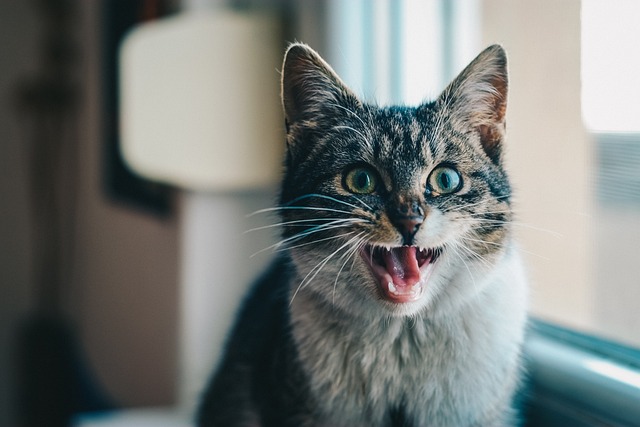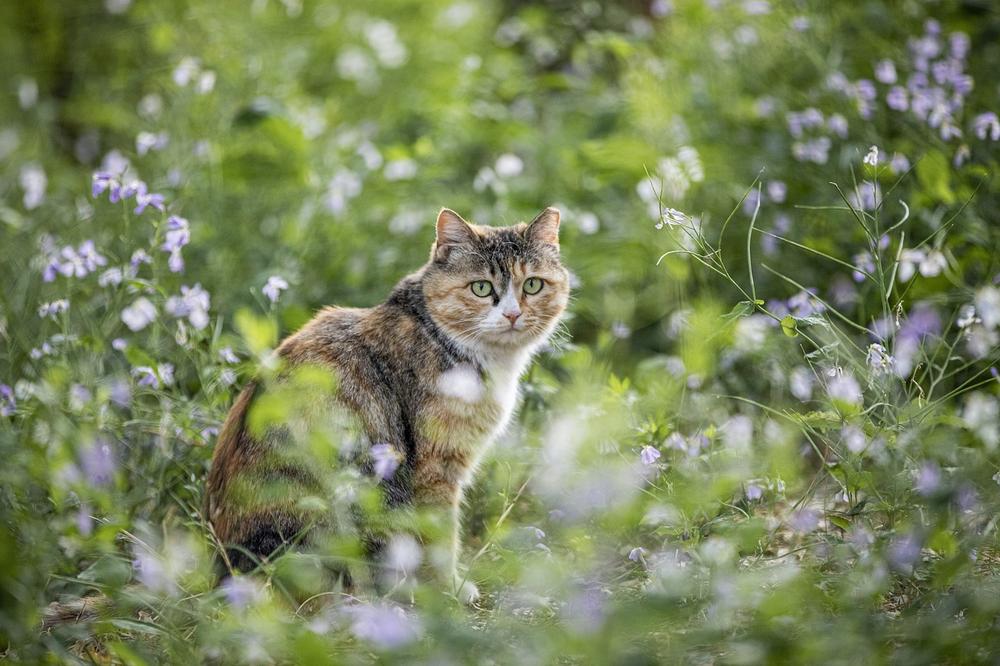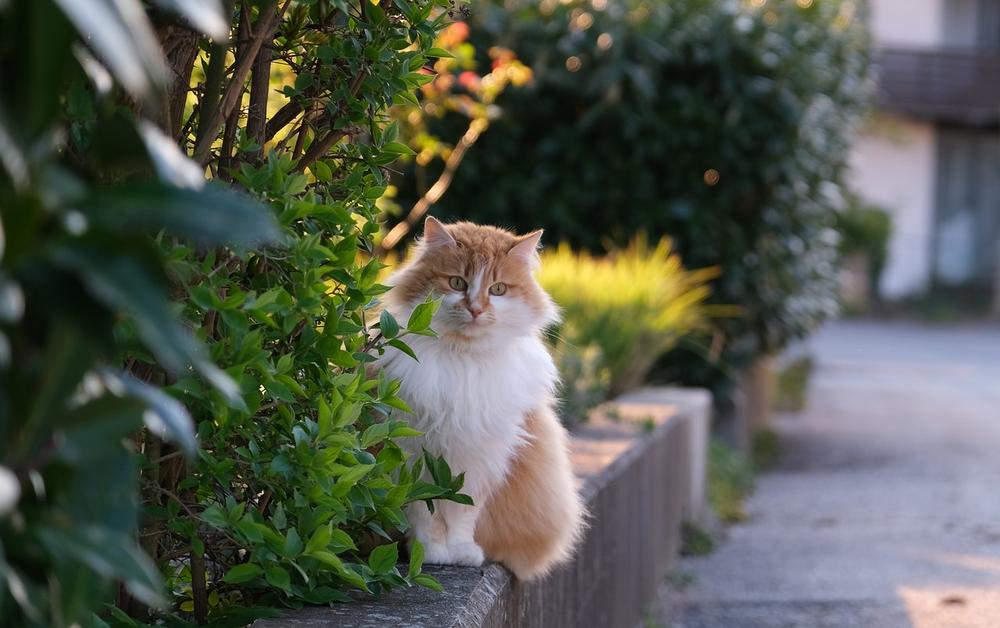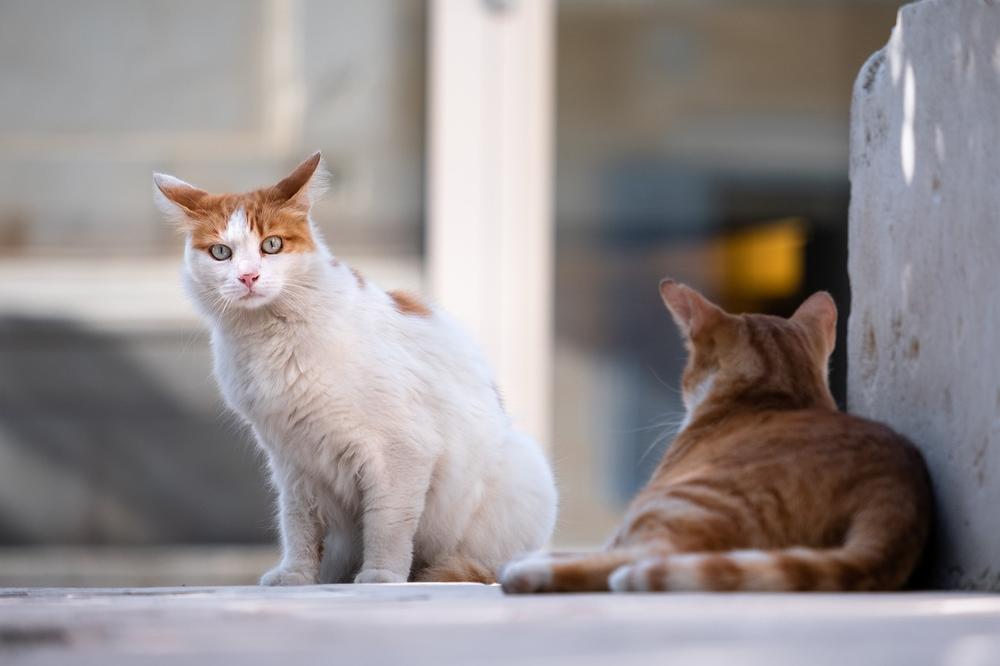Cat Panting After Playing: Is It Normal?

Are you concerned about your furball's health after an intense play session?
Do you wonder if that panting is normal or cause for alarm? 😺
I hear you.
You just want the best for your feline friend.
You're not alone in these worries, my friend.
But worry not, because today we're going to unravel the mystery behind cats panting after play.
So, grab a cuppa and let's dive into this puzzling phenomenon together.
Is Cat Panting Normal?
Cat panting is a normal behavior that helps them regulate body temperature. Unlike humans, cats don't sweat and rely on panting to release heat. However, heavy or rapid breathing may indicate a problem, so you need to monitor their respiratory rate and consult a vet if necessary.
Cats panting is totally normal, especially after playing or during a game.
You see, this panting helps them cool down and regulate their body temperature. It’s like if they had their very own air conditioning system!
Unlike us humans or dogs, cats don't sweat through their pores like we do.
Instead, they rely on panting as a way to release heat from their bodies, which actually works pretty well for them.
Sometimes, you might even notice your cat lightly sweating through the pads on their paws, but that’s about as far as it goes.
These little furballs are smart creatures, and they have adapted to outdoor climates by instinctively seeking shade and shelter to avoid overheating.

Now, while panting is completely normal for cats, you need to keep an eye out for any signs of heavy or rapid breathing.
If you notice that happening, it could be a sign of trouble, known as dyspnea.
So, here's the deal:
The average respiratory rate for cats typically ranges between 15 to 30 breaths per minute.
But if you notice anything significantly outside this range, I would definitely recommend reaching out to your vet just to be safe.
But hey, let me put your mind at ease - occasional panting is simply your feline friend doing their thing, keeping cool and taking care of themselves!
Main points I'll expand upon further down this article:
- Panting in cats can occur for various reasons, including emotional discomfort, high humidity, and health issues.
- Cats pant less often than dogs, primarily using panting to regulate body temperature.
- Panting after physical exertion should resolve after rest and cooling off.
- Avoid playing with an upset or overstimulated cat, opting for shorter play sessions instead.
- Promptly cool down a cat if it is panting due to overheating.
- Panting during play is common in kittens and can be encouraged to calm down.
- Panting during labor and delivery should subside afterward, but if it persists, seek veterinary care.
- Excessive panting, especially if accompanied by coughing or trouble breathing, may require immediate veterinary attention.
- Identifying and minimizing stress triggers for cats is crucial for their health.
- Abnormal panting in cats can indicate underlying medical conditions, and veterinary attention should be sought.
And I'm sure you're wondering why cats pant in the first place!
Well, let me delve into more detail and explain exactly what causes this behavior in our furry feline friends...
Why Do Cats Pant?
Cats pant for several reasons, and it's not just because they want to imitate dogs.
One reason is exercise-induced panting.
Yep, cats need their cardio too!
Panting helps them release heat from their bodies after a rigorous session of chasing lasers or playing with catnip mice.
It's like their own cool-down routine.
Another reason cats pant is when they're feeling nervous or anxious. Just imagine being in a room full of strangers - you'd probably start panting too!
So, if your feline friend is panting and there's no obvious source of heat causing it, it might be a case of nerves.

But wait, there's more!
High humidity can make cats pant as well.
You know that feeling when the air is so thick you could cut it with a knife?
Well, cats feel it too. Panting is their way of trying to keep themselves cool in these sticky situations.
Lastly, panting can be a sign of an underlying health issue. If your cat is panting excessively or seems distressed, it's best to consult with a vet.
There might be something more serious going on that needs medical attention.
Panting in cats may not be as common as in dogs, but it does happen.
So don't dismiss it and always keep an eye out for any unusual symptoms.
When Cat Panting Isn't an Issue
When your cat isn't panting, here are some important things to think about:
- Keep your cat's weight in check. Being overweight can lead to health problems, so make sure they stay at a healthy weight.
- If your cat starts panting randomly while resting, it could be a sign of an underlying issue like heart disease or respiratory problems. Talk to a vet if you see this behavior.
- Things like vet visits, new family members, or changes to their routine can stress out your cat and make them pant. Create a calm and familiar environment to help ease their anxiety.
- Panting during labor is normal, but it should stop after delivery. If it continues, get veterinary care.
If the panting stops on its own within a few minutes of rest, there's usually nothing to worry about.
But it's always better to be safe than sorry.
If you're unsure or notice persistent panting, consult a vet. 😺
And now, moving on to the next section, let's dive deeper into when cat panting should be cause for concern and why immediate veterinary attention may be necessary.
You must monitor any persistent or abnormal panting in your furry friend, as it could potentially indicate a medical emergency that requires urgent medical care...
When Is Cat Panting an Emergency?
When it comes to your cat panting, you gotta be on the lookout for any sudden or continuous panting.
Here are some signs that should make you think cat panting could be an emergency:
- Coughing, feeling lazy, or having trouble breathing: If you see any of these along with the panting, you have to get your vet involved pronto.
- Drooling like crazy or being weak: If your cat is panting and displaying these symptoms, they might need immediate medical attention too.
- Really bad respiratory distress: This means their tongue turns blue or purple, they're not moving much, and their belly is moving fast when they breathe. You better address this with the vet right away.
To keep your cat healthy, you need to figure out what stresses them out and minimize its impact on their well-being.
Cat panting can indicate various conditions, some of which may require urgent veterinary care.

If you notice your cat acting differently, panting excessively, breathing rapidly, or struggling to breathe, don't waste time—get them checked out by a vet because it could mean pain or problems with their heart and lungs that need medical attention.
And if you're wondering about cat panting after giving birth, I've got you covered! After seeing the signs of panting in your cat, it's only natural to feel concerned.
That's why I wrote a helpful blog post called Cat Panting After Giving Birth.
In this article, I dive into possible reasons why your cat may be panting after giving birth and help you determine if it's normal or a cause for concern.
Whether you're curious or worried, my guide will provide the answers you need.
Common Causes of Abnormal Cat Panting
Cats panting weirdly could mean a bunch of different health issues.
Here are some possible culprits:
- Worms in the heart
- Asthma
- Heart problems
- Anemia
- Low oxygen levels
- Pain-related diseases
- Respiratory illnesses
- Rupture in diaphragm
- Exposure to toxins
- Something blocking their airway
- Overactive thyroid
- Issues with their central nervous system
There are other things that might make cats pant too much, like:
- High body temperature
- Problems in the upper and lower airways
- Lung disease
- Cancer
- Swelling in the abdomen
- Anxiety
- Medications
- Breathing troubles due to their snub-nose face shape
Cats can also start panting because of respiratory conditions such as asthma, heart disease, and infections.
If your cat has fluid around their lungs (which usually goes hand-in-hand with heart disease), they might pant and have trouble breathing.
Cat obesity and having a smashed face can cause heavy breathing too, but those things can be prevented.
Feeling too hot or stressed out can also mess up their breathing.
So keep an eye on your cat's breathing and take them to a vet if you notice anything weird or too much panting.
But what if the panting is accompanied by other symptoms?
How can you determine if it's just normal after play, or a cause for concern?
Let's dive deeper into the signs of dyspnea in cats and what to do if you notice them.
Trust me, you don't want to miss this crucial information for your beloved furball's well-being!
Signs & Symptoms of Dyspnea in Cats
If your cat is having trouble breathing, it can be really scary. 😿
But don't worry, I'll tell you what to look for:
- Is your cat breathing with their mouth open? That could mean they're having dyspnea.
- Pay attention to how they're breathing. If you notice any big changes like deep and heavy breaths, that's a sign.
- Take a look at their nostrils. Do they flare out more than normal when they breathe?
- Does your cat get tired really quickly during playtime or exercise? That could be because of dyspnea.
- Keep an eye out for any signs of struggle or wheezing when they breathe in and out.
- Is your cat breathing really fast even when they're just resting? Rapid breathing might be a clue.
- Another thing to watch for is if your cat pants while leaning forward a little bit. Many cats with dyspnea do this.
- Check the color of your cat's gums. Are they paler than usual? That could mean less oxygen.
If you think your cat might have dyspnea, talk to a vet.
They'll do a thorough exam, checking for things like belly pain, anemia, and unusual reflexes.
They might also need to do some tests like blood work, ultrasounds, or x-rays to be sure.
When you transport your cat, ensure to keep them in a carrier or box to minimize stress.
How your cat gets treated will depend on what's causing their dyspnea. It could include things like rest, changes to their diet, surgery, radiation therapy, follow-up visits, or medications.
The important thing is to put your cat's well-being first.
And now, let's take a closer look at what dyspnea actually is and what it means for your cat's breathing...
What Is Dyspnea in Cats?
When your cat has difficulty breathing, it's called dyspnea.
This respiratory distress is marked by labored inhalation and exhalation that makes it tough for the cat to breathe.
Inhaling and exhaling becomes a challenge, causing significant difficulty.
And that wraps up today's article.
If you wish to read more of my useful articles, I recommend you check out some of these: Can Cats Live in a Garage in the Winter, Why Does My Cat Not Drink Water, How Long Can Cats Hold Their Poop, Should I Quarantine My Cat With Tapeworms, and Is Lavender Oil Safe for Cats
Talk soon,
-Sarah Davis